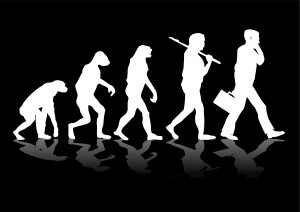The Evolution Of Job Interviews
Looking back through history, how we go about getting a job has changed dramatically, evolving to the point of ultra-convenience. Spark Hire’s infographic, “The Evolution of Job Interviews,” reveals some important insights on the future of job interviews. Here are the highlights of the infographic:

Ancient Times
Young people living in Ancient Rome, Greece, and Egypt became skilled in a particular craft by working as an apprentice.
Eighteenth Century (1700-1800)
Families developed a trade or profession and groomed their children from an early age to take over their work. When tradesmen did not have children, they took on apprentices, and those individuals had to work under a binding service contract. Benjamin Franklin apprenticed under his older brother in the printing business.
Nineteenth Century (1800-1900)
The explosion of factories and other industrial growth created millions of jobs in which people would have to leave the home. These were primarily low-skilled jobs located in cities. People who were not skilled for a job were dispensed in favor of people who could do the job.
The Rise of the Job Interview
+ By 1830, the construction of railroads in America opened up travel opportunities to all. The concept of going to interview for a job in another location spread.
+ By 1908, the introduction of the Ford Model T ensured people with a car could drive longer distances for a job interview, not just take the train.
+By 1921, Thomas Edison was giving a written interview to prospective job candidates to assess their knowledge.
Technology Transforms Interviewing
Thanks to Alexander Graham Bell’s invention of the telephone in 1876, job interviewing would take many forms over the next 130 years. Job seekers began interviewing over a landline telephone to using their cell phone to speak with employers anytime and from any location. In the latter part of the 20th century, interviewing began to include use of a computer or mobile device. In the 21st century, interviewing via video chat grew in popularity. Presently, 60 percent of employers interview through video technology for remote hiring.
What the Future Holds
In the future, interviewers will continue to employ the newest technologies and obtain an accurate assessment of a recruit’s suitability for a position. Future emphasis will be on both convenience and precision. People will interview in a shorter format, such as having a brief conversation via Snapchat, and will use technologies such as Smart watches. Voice analysis software will reveal the truth behind what candidates say to employers in the interview, and conversations may be conducted through holographic projections. Getting a job is radically different now using a Smartphone to Skype or Snapchat than it was when a person had to board a train in Boston and interview in San Francisco, but this age of interviewing is infinitely more convenient.